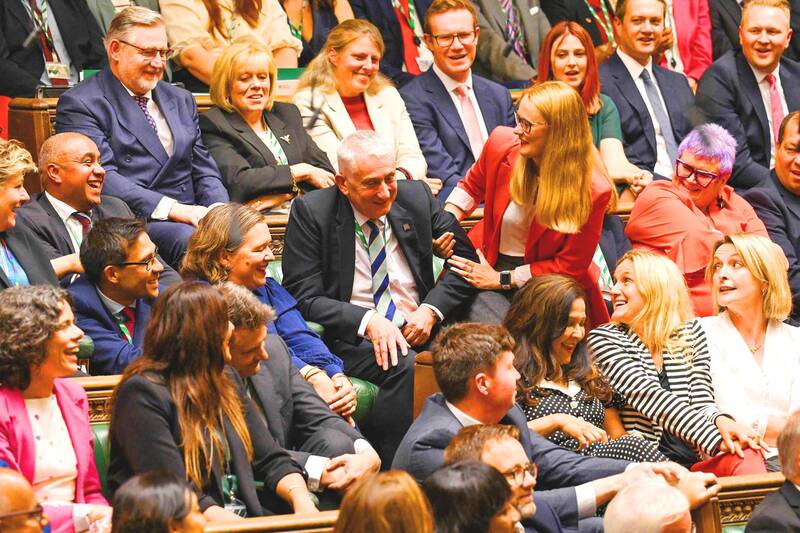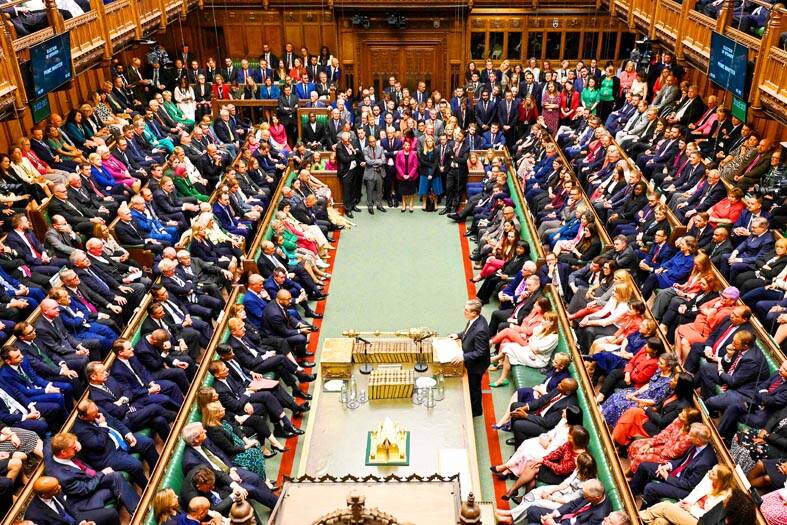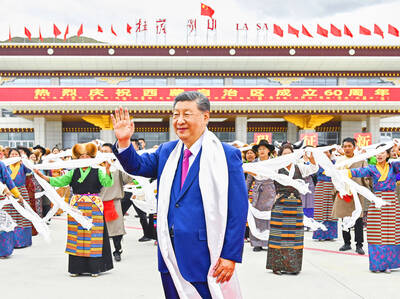Hundreds of newly elected lawmakers on Tuesday trooped excitedly into Parliament after the UK’s election brought a Labour government to power.
The halls of the labyrinthine building echoed with excited chatter of the 650 members of the British House of Commons — 335 of them arriving for the first time. That compares with 140 new lawmakers after the previous election in 2019.
The seat of British democracy took on a back-to-school feel, from the rows of lockers temporarily installed in wood-paneled corridors to the staff holding “Ask Me” signs ready to help bewildered newcomers.

Photo: AFP / UK Parliament
The new House of Commons includes the largest number of women ever elected — 263, or about 40 percent of the total — and the most lawmakers of color, at 90.
The youngest new lawmaker is Labour’s Sam Carling, 22. He is one of 412 Labour legislators elected last week who are to cram onto green benches on the government side of the House of Commons.
Opposite them is to be a shrunken contingent of 121 Conservatives, a vastly increased number of Liberal Democrats, 72 strong, and a smattering of representatives from other parties, including the Green Party and Reform UK.

Photo: AFP / UK Parliament
Even as the newcomers arrived, lawmakers who lost their seats last week were carting away the contents of their offices.
The first task for lawmakers was electing a speaker to oversee the business of the House of Commons and try to keep the often unruly assembly in line.
The speaker is chosen from the ranks of lawmakers and sets their party affiliation aside while they fill the impartial role.
Lindsay Hoyle — originally elected for Labour to the speaker’s post in 2019 — was re-elected unopposed.
He promised lawmakers he would continue to be “fair, impartial and independent.”
In keeping with tradition, the speaker feigned reluctance and was dragged to the speaker’ chair by colleagues — a custom dating to the days when speakers could be sentenced to death if they displeased the monarch.
After tributes from party leaders, including British Prime Minister Keir Starmer and Conservative leader Rishi Sunak, the speaker-elect was taken to the House of Lords by an official known as Black Rod to receive Royal Approbation, the formal approval of King Charles III.
Starmer said that all lawmakers had a responsibility “to put an end to a politics that has too often seemed self-serving and self-obsessed, and to replace that politics of performance with the politics of service.”
Sunak, fresh off the Conservatives’ election defeat, agreed that “in our politics, we can argue vigorously, as the prime minister and I did over the past six weeks, but still respect each other.”
With a speaker in place, lawmakers were sworn in one by one, taking an oath of allegiance to the king and “his heirs and successors.”
The longest-serving lawmakers — Conservative Edward Leigh and Labour’s Diane Abbott, known as the father and mother of the House — were sworn in first, followed by the prime minister and the Cabinet, senior members of the official opposition and then remaining lawmakers in order of their length of service.
There are also seven lawmakers from Irish nationalist party Sinn Fein, who refuse to swear loyalty to the Crown and do not take their seats to protest UK control over Northern Ireland.
After all of the members are sworn in — a task expected to take several days — the House of Commons is to rise until July 17, when a new session is to formally start with the State Opening of Parliament.
The new government will set out its legislative plans for the coming year in a speech read by the king from atop a golden throne.

Ten cheetah cubs held in captivity since birth and destined for international wildlife trade markets have been rescued in Somaliland, a breakaway region of Somalia. They were all in stable condition despite all of them having been undernourished and limping due to being tied in captivity for months, said Laurie Marker, founder of the Cheetah Conservation Fund, which is caring for the cubs. One eight-month-old cub was unable to walk after been tied up for six months, while a five-month-old was “very malnourished [a bag of bones], with sores all over her body and full of botfly maggots which are under the

BRUSHED OFF: An ambassador to Australia previously said that Beijing does not see a reason to apologize for its naval exercises and military maneuvers in international areas China set off alarm bells in New Zealand when it dispatched powerful warships on unprecedented missions in the South Pacific without explanation, military documents showed. Beijing has spent years expanding its reach in the southern Pacific Ocean, courting island nations with new hospitals, freshly paved roads and generous offers of climate aid. However, these diplomatic efforts have increasingly been accompanied by more overt displays of military power. Three Chinese warships sailed the Tasman Sea between Australia and New Zealand in February, the first time such a task group had been sighted in those waters. “We have never seen vessels with this capability

A Japanese city would urge all smartphone users to limit screen time to two hours a day outside work or school under a proposed ordinance that includes no penalties. The limit — which would be recommended for all residents in Toyoake City — would not be binding and there would be no penalties incurred for higher usage, the draft ordinance showed. The proposal aims “to prevent excessive use of devices causing physical and mental health issues... including sleep problems,” Mayor Masafumi Koki said yesterday. The draft urges elementary-school students to avoid smartphones after 9pm, and junior-high students and older are advised not

Chinese President Xi Jinping (習近平) attended a grand ceremony in Lhasa yesterday during a rare visit to Tibet, where he urged “ethnic unity and religious harmony” in a region where China is accused of human rights abuses. The vast high-altitude area on the country’s western edge, established as an autonomous region in 1965 — six years after the 14th Dalai Lama fled into exile — was once a hotbed for protest against Chinese Communist Party rule. Rights groups accuse Beijing’s leaders of suppressing Tibetan culture and imposing massive surveillance, although authorities claim their policies have fostered stability and rapid economic development in